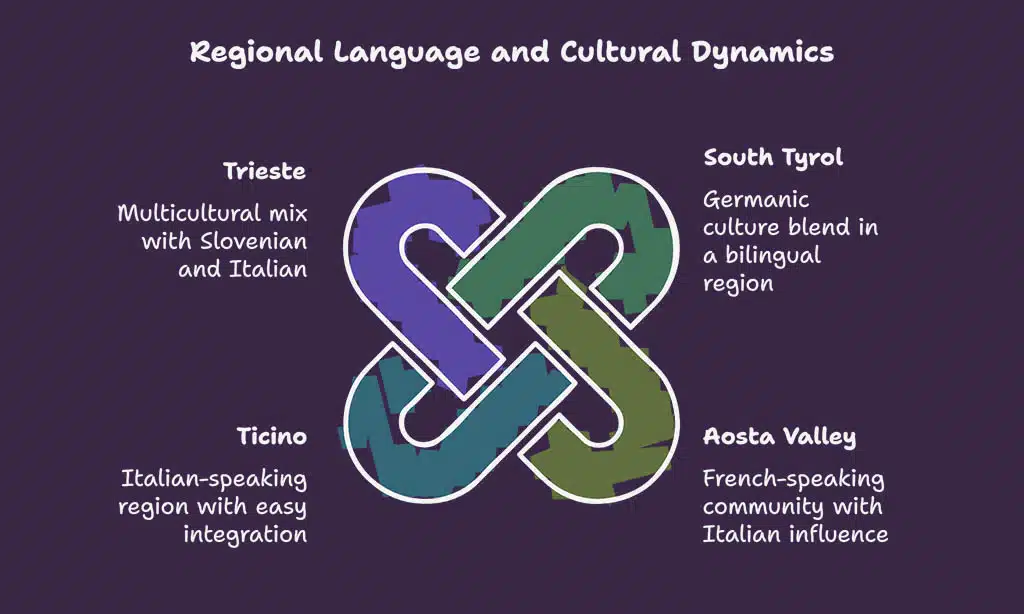Italy is a dream destination for many people looking to invest in real estate. From the snow-capped Alps to scenic lakes and lush countryside, Italy’s border regions offer unique opportunities for property buyers. Whether you’re planning to settle down, invest, or enjoy holidays in a beautiful cross-border location, buying property in Italy’s border regions requires careful planning and understanding.
This guide explores the 10 most important things to consider before buying a house in these unique parts of Italy. It will help you avoid common mistakes and make an informed decision that aligns with your goals.
1. Understand the Region’s Geopolitical Importance
Italy shares borders with France, Switzerland, Austria, and Slovenia. Each of these borders creates distinct real estate dynamics influenced by language, culture, and legal rules. These regions are also known for stability, economic opportunities, and cross-border commuting.
Border Town Benefits at a Glance
| Border Region | Key Advantage | Popular Towns |
| Italy-Switzerland | Low taxes, high resale value | Como, Chiasso, Domodossola |
| Italy-France | Culture blend, good transport | Ventimiglia, Bardonecchia |
| Italy-Austria | Mountain scenery, skiing | Tarvisio, San Candido |
| Italy-Slovenia | Affordable living, EU access | Gorizia, Trieste |
Living close to the border offers flexibility. Many people live in Italy but work in neighboring countries to enjoy tax and lifestyle benefits.
2. Know the Local Property Laws and Regulations
Buying property in Italy as a foreigner is legal, but the process can vary depending on your nationality. Citizens from the EU enjoy fewer restrictions, while non-EU citizens may need specific permissions.
Key Legal Considerations
| Requirement | EU Citizens | Non-EU Citizens |
| Right to buy | Yes | Yes (with reciprocity) |
| Tax Code (Codice Fiscale) | Required | Required |
| Residency status needed? | No | Sometimes (depends on region) |
| Legal assistance | Highly recommended | Essential |
Hiring a bilingual real estate lawyer can help you navigate contracts, ensure transparency, and protect your rights.
3. Research Cross-Border Tax Implications
Buying property near Italy’s borders often involves cross-border tax issues. If you work or earn income in a neighboring country but live in Italy, tax treaties between Italy and that country will affect your tax situation.
Cross-Border Tax Snapshot
| Country | Has Tax Treaty with Italy? | Property Tax Notes |
| Switzerland | Yes | Double taxation agreement in place |
| Austria | Yes | Low income tax for border workers |
| France | Yes | Mutual property tax regulations |
| Slovenia | Yes | Tax reporting needed in both countries |
Consult with a tax advisor who understands international property and residency issues to avoid surprises.
4. Evaluate Property Prices and ROI Potential
Prices can vary widely depending on proximity to international borders and popular tourist areas. Lakeside properties in Como or border towns near Switzerland are more expensive but offer strong ROI potential.
Property Price Overview
| Town/Area | Avg. Price per m² | ROI Potential |
| Como (Swiss Border) | €4,000+ | High |
| Ventimiglia (French Border) | €2,500 | Medium |
| Tarvisio (Austrian Border) | €1,800 | Moderate |
| Gorizia (Slovenian Border) | €1,300 | Medium |
Consider whether you’re buying for personal use, rental income, or long-term investment.
5. Analyze Infrastructure and Accessibility
Accessibility is essential, especially if you plan to commute or frequently travel. Border regions typically have good infrastructure, but it varies from town to town.
Infrastructure Highlights
| Region | Nearest Airport | Public Transport | Road Quality |
| Como | Milan Malpensa | Excellent | High |
| Trieste | Trieste Airport | Good | Moderate |
| Tarvisio | Klagenfurt (Austria) | Moderate | High |
| Ventimiglia | Nice (France) | Excellent | High |
Check for train stations, cross-border roads, and proximity to major cities.
6. Language and Cultural Integration
While Italian is the official language, border areas often have bilingual or multilingual communities. This makes communication easier for expats, but learning basic Italian still helps.
Language and Culture Summary
| Region | Common Languages | Cultural Notes |
| South Tyrol (Austria Border) | German, Italian | Germanic culture blend |
| Aosta Valley (French Border) | French, Italian | French-speaking community |
| Ticino (Swiss Border) | Italian | Easy integration for Italians |
| Trieste (Slovenian Border) | Slovenian, Italian | Multicultural mix |
Attend local events and join expat groups to better integrate into the community.
7. Understand Healthcare and Social Services Access
Italy has a high-quality public healthcare system. As a resident, you can register with the National Health Service (SSN) and access public hospitals and clinics.
Healthcare Overview
| Feature | Available to Foreigners? | Notes |
| Emergency services | Yes | Free or low-cost |
| Residency required | For full access | Needed for SSN registration |
| Private insurance | Optional | Recommended for non-residents |
If you’re living close to the Swiss or Austrian border, you may also qualify for some cross-border healthcare services.
8. Check Climate and Environmental Risks
Climate varies depending on elevation and location. Mountain regions have snowy winters, while coastal areas have mild climates.
Climate Comparison
| Region | Climate Type | Environmental Risks |
| Alps (North Italy) | Alpine | Snow, landslides |
| Liguria (French Border) | Mediterranean | Coastal storms |
| Friuli (Slovenian Border) | Continental | Flooding risk |
Consider heating needs, insulation, and proximity to flood or snow zones.
9. Explore Visa and Residency Opportunities
Buying property doesn’t automatically grant residency, but it can support certain visa applications.
Visa Options for Property Buyers
| Visa Type | Suitable For | Requirements |
| Elective Residency | Retirees | Stable income, private health insurance |
| Investor Visa | High net-worth individuals | €250,000+ investment |
| Golden Visa | Not available | Italy does not offer one currently |
Always check the latest regulations through official sources or immigration lawyers.
10. Partner with a Local Real Estate Expert
Working with a local real estate agent or broker is highly recommended. They understand the market, know local laws, and can help with translations and negotiations.
Benefits of Hiring a Local Agent
| Benefit | Why It Matters |
| Legal guidance | Prevents fraud and errors |
| Market knowledge | Helps find the right property |
| Negotiation support | Ensures better deals |
| Local connections | Access to off-market listings |
Look for agents registered with Italy’s Chamber of Commerce and check reviews or recommendations.
Takeaways
Buying a property in Italy’s border regions can be a rewarding experience, whether you’re looking for a scenic home, an investment, or a new lifestyle. By considering regional dynamics, legal issues, taxes, infrastructure, and local culture, you’ll be better prepared to make a smart decision.
Always seek advice from trusted local professionals and take your time to research. With the right knowledge and support, you can turn your dream of owning a house in Northern Italy into a reality.









































